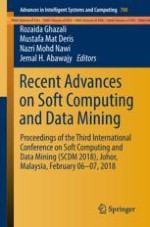2018 | OriginalPaper | Buchkapitel
Comparison of Approaches Made to Enhance Pupils’ Numeracy Skill
verfasst von : Nur Faizura Ahmad Fuadi, Muhammad Fakri Othman, Norhalina Senan
Erschienen in: Recent Advances on Soft Computing and Data Mining
Aktivieren Sie unsere intelligente Suche, um passende Fachinhalte oder Patente zu finden.
Wählen Sie Textabschnitte aus um mit Künstlicher Intelligenz passenden Patente zu finden. powered by
Markieren Sie Textabschnitte, um KI-gestützt weitere passende Inhalte zu finden. powered by
